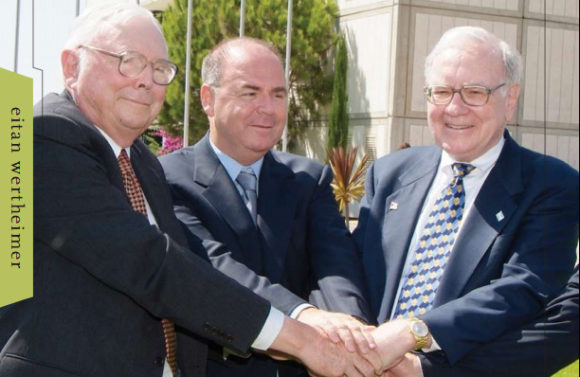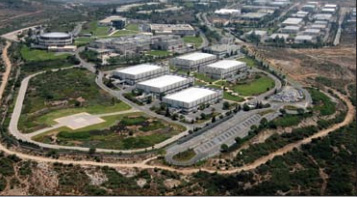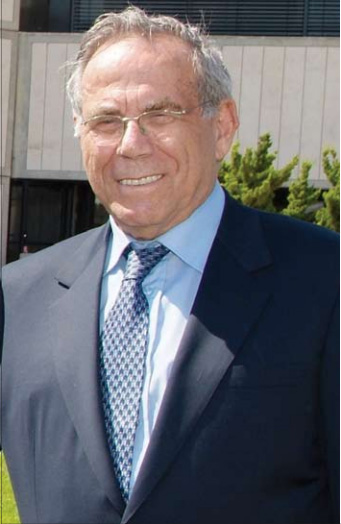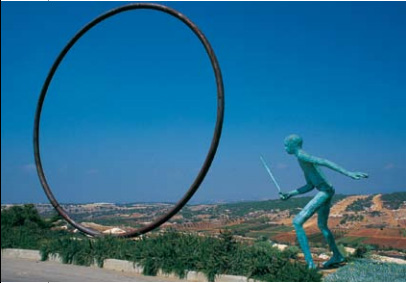By Lloyd & Noah Graff
Today’s Machining World Archives September 2007 Volume 03 Issue 09

Lloyd Graff: I read your bio, and there isn’t that much about you personally.
Eitan Wertheimer: ISCAR was started in 1951. I was born in ’51. My father wanted to name the company after my name, but my mother told him, “Maybe it won’t be successful, so don’t do it.” So he called it ISCAR, Israel Carbide.
Lloyd: Israel Carbide, ISCAR; the company has been synonymous with Israel for its whole history. You were born four years after Israel was born. The company grew parallel to the state. What does selling out to Warren Buffet in 2006 mean in terms of Israel, or was it purely a business decision on your part?
Eitan: It wasn’t selling out. It was a basic idea of becoming part of something bigger, and happily that opportunity opened up. We wanted to secure our customers and our people for yet again another 50 years or more.
Lloyd: What do you gain by being with Berkshire Hathaway?
Eitan: We didn’t do it because we needed the money, or because we were unsuccessful. We just wanted to solve problems before we get to that years from now. Maybe I’ll change my mind in 20 years, but we still have 20 years for that.

Lloyd: Does it bother you that Warren Buffett may not be here in a few years?
Eitan: We all are asking that question, but I hope that his legacy lives much longer after himself. I wish him all the best, and wish all of Berkshire Hathaway that the future will be as good as the beginning. The main question will be whether the past pattern of 40 years sticks for a longer time because we have a very strong culture in our organization and we like it.
Lloyd: I talked to a person who worked for ISCAR and he talked about going to Tefen (co.headquarters) and meeting with Jacob Harpaz (head of cutting tools). He said with Harpaz, he experienced the most inspiring sessions he ever had in his career. What impressed him was that Harpaz talked about the new product coming out, but then would say, “But after they challenge us on that product, we’ve got this product, and then after they challenge us on that product, we have this product to come in.” Like he was thinking three products down the cycle. I wonder if you could elaborate on that as it applies to the sale of the whole company.
Eitan: First of all, I can very objectively say that I think Harpaz’s [department] is one of the best in our company. I’ve seen the results and I have a lot of admiration for Jacob. The other element is that our customers need something better every year. Every year they have to become more competitive, do something faster, more clever, less mistakes, less time, less rejects. We must improve ourselves continuously. Just having a single event of something good is not sufficient in any industry, for sure not in our industry; your magazine must be full of new things. Nobody would advertise inserts from 1964. I haven’t seen anybody lately selling an IBM 286. It would be a very good price, but what the hell do you do with that thing. It wouldn’t work anymore in our world. The new machines, the new materials, the fact that you do net shape and casting better, and the roughing brings different need for other tools, so you must think as a process, not only as single products. We’re trying to be part of the book of industrialization in the metal world, and do it in clever industrial areas. Therefore we look for clever products, for productive, clever customers when looking for the next story. You see the revolution coming in countries not export-oriented; and you see the export-oriented countries, how eager they are to get down the road of efficiency, improvement and higher level of quality. You have to think as a continuous story. You’re not impressive in a single time event.
Lloyd: Which is part of why you sold to Buffett?
Eitan: We sold to prepare ourselves for 15 years down the road. But at the same time, we want to sing our song. There’s a song that says, “First, I sang for the song, and then I sang for the money and then I sang for the glory, but now I’m back singing for the song because I like to sing.” So somebody does his thing, it is good; and we want to do our thing. We want to sing our song. That’s all. Our song is customers and people and innovation and technology, and we love that world. To bring Warren Buffett to the world of manufacturing was a lot of fun for me. Usually attention goes to people on Wall Street with the glamour, titles, and newspaper stories, but somebody has to make the machine. Somebody has to make the machine tools for them. Somebody has to make the physical engines and wheels and bolts and nuts.
Lloyd: Did Buffet get it?
Eitan: Yeah, I took him to IMTS here in Chicago. I’m going to take him to more shows, because I think it’s time that people respect the people who manufacture things. Listen, making clever machine parts is a good thing. I’m happy to help in that process because I come from that field. I think about people who make parts so people can [drive] a car, or keep their health, or get more home comfort, or wash their clothes, or get their glasses, or allow the newspapers to be at your table. You should not neglect the people that make things. So for us, doing this with Warren Buffett is a nice endorsement that our field is important; not more, not less than anybody else, but for sure not less.
Lloyd: If you were to describe your company –ISCAR– would it be a manufacturing company, a technology company or a marketing company?
Eitan: All the above. If you don’t have two legs, hands, eyes and ears to listen, you’re not a full body. You must be a full body. You must manufacture and be a very clever manufacturer. You must use the latest technology, and you must sell your stuff or it’s going to sit in inventory and you won’t be around after awhile. If we sell something we didn’t make, we won’t be successful. If we don’t use technology to make new things, we will not be very interesting, and we want to be interesting.
Lloyd: I saw that you are involved with this Clean Tech initiative in Israel and there was some talk about working with Mr. Agassi on battery-operated cars. Could you tell me something about this?
Eitan: Shai Agassi is the man running it and I’m just helping him a bit. It’s his baby, which I think is clever and the right type of baby to get ourselves into – also to be part of clean energy, clean up our environment and be more efficient with our long-term needs.
Lloyd: You have had a long-term interest with antique cars in Tefen.
Eitan: I was fascinated by cars as a child, and still am. I used to read every catalog I could get my hands on. In ’76 I visited Detroit for the first time, and near the airport I saw a sign saying how many cars were sold. I was fascinated. Then I visited car factories. For many of us, it goes to our past, and our past is our cars; it’s a perfect combination of technology and aesthetics.

Lloyd: What do you drive?
Eitan: I have a Chrysler and a very old pickup. I have two museums of cars. My first car in America when I lived here in the early 80s was a 1970 Pontiac Catalina. I loved that thing.
Lloyd: It was like 90 feet long.
Eitan: It was a huge, huge thing. I used to fix it up. Me coming from a small country and having a big American car; I didn’t need any more dreaming after that.
Lloyd: I understand you lived in New Jersey and later went to Harvard Business School.
Eitan: Much later. Then I worked for a while with the nephew of Albert Einstein.
Lloyd: So you worked in America and then went back to Israel?
Eitan: I worked at ISCAR as a kid, then I went out to do my thing. After coming back from the States, I did a lot of turnaround deals, but all in metal; clever products, clever materials, clever customers.
Lloyd: Are you trained as an engineer?
Eitan: I am learning. You can either learn some in school, or learn by doing. Driving, you learn in the streets, not in school, so I had little time in school and a lot of time on the streets. But my main specialty is finding people much better than me. I think I’m very lucky. From the age of three I had two of my father’s Popular Mechanics magazines from World War II. My first technical education was from him and Popular Mechanics.
Lloyd: Do you see radical changes in the cutting tool field?
Eitan: It has several forces. It’s materials that we will try to machine and the tools that we will use to machine them – fast or slowly. Then you have the issue of the machines, then the issue of the application. In the past we used to do rough machining and the whole form. Today it’s about the finishing of things – we get away from grinding and try to turn it. A lot of applications I don’t think are really solved yet. It still will take five to 10 more years to really understand how material behaves.
Lloyd: Do you think that the high price of nickel, which affects stainless steel, will push more people towards different kinds of materials?
Eitan: It depends. Certain places need certain material strengths and I think you can get some of it through the geometry, the material or a combination. I think a lot of industries are throwing a lot of material away and they want to be able to throw away less. In the aerospace business I see a high “buy to fly” ratio, which has a long way to go.
Lloyd: What do you mean “buy to fly”?
Eitan: You buy one pound of material. How many parts of the pound will fly? How much do you buy and how much will really be the end product.
Lloyd: We did a piece a few months ago after IMTS about the X1 Corporation process of printing metal parts using metal layering. This could have a big effect longer term on the cutting tool business and on the materials used. You don’t think so?
Eitan: I doubt it, because I think the metal wants to be alloyed, to come together in certain processes. I think the (printing) process is very expensive, but it has a lot of flexibility from a geometrical point of view. For a short series it could work.
Lloyd: Talking about quality, I saw that you recently built a plant in China. Do you worry about losing control over your intellectual property?
Eitan: Look, worry is a part of life. I mean a lot of people overcome fears by inventing new fears. I’m not sure it solves anything. The only way we have a chance to be the best in intellectual property is to keep on inventing. We’ll be copied, of course. So we have to live with that phenomenon, but sooner or later more countries will be part of the legal process that honors people’s rights. It’s a process. China is not yet there, but it will be one day. We may win sometimes; we may lose sometimes, but we’re going to keep on developing. We are aware that today it’s easier to be a copier because technology makes life easier. In the past it was much more difficult.
LG: But we also live in a dangerous world. In Israel a year ago bombs were dropping on you. What happened to the factory during the war?
Eitan: We sent half the people to Tel Aviv and kept on working. We didn’t miss a single shipment or customer.
NG: But you moved half the people?
Eitan: First of all, we have a lot of automation. Second, other people just worked harder and they loved it because they wanted to show what we can be. The other element is that Israel is only one-third of our workforce. Most of the other people are in Korea, Rockford, Dallas, Brazil, China, Japan, Italy, France, and England. Of course, we knew something could happen one day. And I must tell you, in the war we lost two cars. On a normal day, somebody could have an accident and we might lose two cars. But everybody came home healthy. That’s amazing.
Lloyd: Do you look at the Lebanon War as Round One?
Eitan: I don’t know. I have no idea. I have no way to judge yes or no. But we do a lot of activity with Israeli Arabs. Our factory is a totally mixed factory. We have Jews, Christian Arabs, Muslim Arabs, Druze. For 50 years we have had wonderful relations. Industry and economy can be twofold peacemaking.
Lloyd: I wrote an article about the three “I’s” of Israel, Ireland, and India – three economies booming amidst political craziness with wars.
Eitan: Tension brings creativity. It’s unfortunate what I’m saying, but that’s life. I must say that you’re 100 percent right.
Lloyd: Do you have investments in India?
Eitan: We have very big market share in India with a very nice factory in Bangalore growing leaps and bounds. We also have another partnership in Pune.

Lloyd: What has been the best part about your business relationship with your father?
Eitan: The main thing – respect. Each one of us is very independent. We had to work together, and we accepted each other’s ways, and it worked fantastically. I’ve seen other places that somebody comes to look over your shoulder too many times – that’s very difficult. The second element is you have to do it early. You don’t start learning a business when you’re 55. You have to start when you’re willing to make mistakes, and you can accept them when you are still young.
Lloyd: Do you think the family model of business can still work?
Eitan: I’ve heard 84 percent of the businesses in the U.S. are family businesses. Everybody does it; it must be something not that bad.
Lloyd: Do you have children?
Eitan: I have 5 children. You don’t teach your children driving or your wife to drive unless you want to wreck the family, so you have to keep rules. For children, don’t give them too much sugar. You don’t make their life too sweet. Teaching is good but not sugaring around. Sometimes that works. With my father I had a wonderful time, but I see many other guys where it didn’t work.
I told my children, “Do exactly what you want.” I prefer for them to be entrepreneurs, not to be guarding what father or grandfather did. I enjoyed like hell building what I built. I enjoyed doing turnarounds as a young man. Today I’m looking for the next adventure in the industry. I love industry. I love production. I like to work in the factory. I like the people. This is my life. I don’t want to change it. Maybe somebody will say this is very stupid, but this is my life.

1 Comment
Dear Lloyd,
It was good interview.
Perhaps, Eitan does not know the reality of Iscar’s operations in India and that they are constantly loosing market share of their parent brand- Iscar.
There is no investment in India for Iscar it’s for the brand they took over afterwards like Taegu-Tec of Korea.
Gaining market share from take over brands and loosing market share of parent brand is not healthier sign in any way.
I hope he will study the scene in holistic way and act. His competitor Sandvik and Kennametal group are having much larger investments and presence than that of Iscar.
Regards, Krishnan